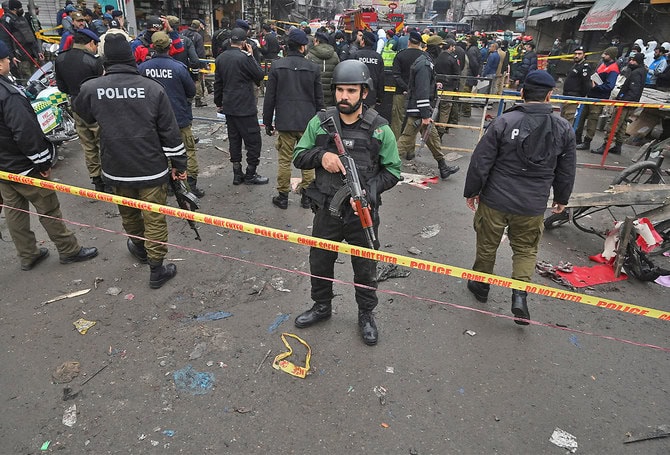Alwaght- In recent decades, Pakistan has faced a relentless wave of terror attacks, posing a significant threat to its stability and security. Situated in a volatile region, particularly bordering Afghanistan, the country has been caught in the crossfire of complex security challenges.
These crises are fueled by a mix of internal vulnerabilities and external pressures, including regional instability and international geopolitical dynamics. In recent months, the threat of terrorism has escalated sharply, with the western provinces bearing the brunt of the violence. These areas have become flashpoints for brutal clashes, leaving a trail of bloodshed and deepening the nation’s security woes.
In this connection, a large number of unknown armed men attacked a police vehicle in the northwestern Pakistani province of Khyber Pakhtunkhwa, killing at least five. The deadly attack was carried out on Monday morning in the Dharaban area on the outskirts of Dera Ismail Khan. In a message, Pakistan's interior minister strongly condemned the attack on the police force, saying that four policemen and a civilian were killed in the incident.
So far, no group has claimed responsibility for the attack, but the terrorist group Tehreek-i-Taliban Pakistan (TTP) claimed responsibility for many deadly bombings, suicide attacks and attacks on security forces in the province in the past.
Meanwhile, the Pakistani army announced on Saturday that at least 23 terrorists were killed and 18 security forces were also killed in a strike operation against terrorist elements in the country's Balochistan province. According to the Pakistani army's public relations department, the security forces' operation was carried out following a plot by separatist terrorist elements near the Qalat area to block communication roads.
“The terrorists have severely affected the daily lives of the local residents by creating terror and at the same time disrupting peace and security, which is why urgent military operations have been launched to neutralize this threat," the army statement read.
The Pakistani army stressed that the security forces, along with the people, are determined to ward off attempts to destroy peace, stability and development of the province of Balochistan and "such sacrifices of the brave soldiers of the country solidify our resolve."
Although attacks by terrorist groups against Pakistani army forces and Shiites were carried out in the past, this issue has recently become a major security challenge. The Islamabad-based Pakistan Institute of Conflict and Security Studies (PICSS) on Sunday reported that the country witnessed a sharp increase in militant attacks in January 2025, which is a 42 percent increase compared to last December. The monitoring institute said that 120 people, including 52 security personnel, 20 civilians and 48 terrorists, were killed in 74 terrorist attacks across the country.
Pakistan reaping consequences of its negligence of terrorists
The most important motivation for the terrorist groups to run rampant in Pakistan is the negligence by security forces, especially the Inter-Servive Intelligence (ISI) which has played down the threats posed by these groups in recent years.
If Pakistan had carried out powerful operations against these groups in the past two decades, the separatist terrorists would not have gained such strength enabling them to target civilian security forces regularly. It is even said that the ISI supports some of these groups as a lever of pressure against neighboring Iran.
Iranian officials have repeatedly warned Islamabad officials about the dangers of terrorists in the past two years, but there was no ear in Pakistan for Tehran warnings. If Islamabad had cooperated with Iran in this regard, most of the threats from separatist groups would have disappeared and peace would have prevailed on the borders of the two countries.
Iran is vigilant against the dangers of these groups, and for this reason, recently, Major General Mohammad Bagheri, the Chief of General Staff of the Armed Forces, visited Pakistan to discuss deterring common threats. Iran has always voiced its readiness to eliminate terrorist threats on the borders, and now it is up to the officials of Islamabad to decide whether or not they want to obliterate these sources of threat.
If Pakistan shows weakness in the face of these groups, terrorist attacks not only step up destabilizing activities, but also contribute to political and economic instability. In many cases, these attacks have raised concerns both domestically and internationally about the future of the country. In some areas, particularly in Balochistan and other tribal provinces, groups often based on religious and ethnic identity are engaged in violence against each other, and these groups may support internal tensions or external influence.
In addition to posing security threats within Pakistan, these groups can also impact regional stability. Although the Pakistani government is fighting these groups, problems such as domestic and foreign support for terrorists, lack of resources, and the country’s unique geographical conditions have complicated the fight against terrorism.
Widespread poverty and social injustice in some areas, especially in the tribal areas, are among the important factors that encourage individuals to join terrorist groups. This exacerbates the cycle of violence and unrest in the country. The government faces many challenges in countering terrorism, including problems with coordination among security forces, intelligence gaps, and sometimes a lack of political will to combat terrorist groups.
Therefore, Pakistan can count on Iranian backing in countering terrorists, and since pro-Iranian resistance forces have made gains and honed their combat skills against terrorists in Iraq and Syria in the past decade, they can pull it off against separatist groups on two sides of the border, and if Islamabad leaders show some will, together they can uproot these groups for good.
The two countries share long borders and this can play as a benefit when it comes to intelligence sharing and joint operations. Cooperation in border watch and security consolidation in these areas can remarkably contribute to blocking movement of terrorists. By sharing intelligence on operations meant to identify and chase terrorist members, Iran and Pakistan can take more preventive actions.



























